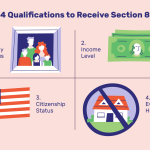The Benefits of Investing in Section 8 Housing: A Comprehensive Guide for Investors
Section 8 housing, also known as the Housing Choice Voucher Program, is a federal program designed to assist low-income individuals and families in obtaining affordable housing. While some investors may overlook Section 8 housing due to misconceptions or concerns, this article aims to highlight the numerous benefits of investing in Section 8 properties. From guaranteed rental income to lower vacancy rates and government support, Section 8 housing can be a lucrative and socially responsible investment opportunity for savvy investors.
Understanding Section 8 Housing Before delving into the benefits for investors, it’s crucial to understand how Section 8 housing works. The program is administered by the U.S. Department of Housing and Urban Development (HUD) and provides rental assistance to eligible tenants. Tenants who qualify for Section 8 vouchers pay a portion of their rent based on their income, while the remaining portion is covered by the voucher. Landlords who participate in the program must meet HUD’s housing quality standards and agree to reasonable rent amounts.
Benefits for Investors
- Guaranteed Rental Income: One of the most significant advantages of investing in Section 8 housing is the assurance of rental income. Unlike traditional rentals where tenants may face financial challenges or delays in paying rent, Section 8 vouchers are backed by government funds. This means that landlords receive a consistent rental payment from HUD, reducing the risk of income fluctuations and ensuring a steady cash flow.
- Lower Vacancy Rates: Section 8 properties often have lower vacancy rates compared to market-rate rentals. This is because the demand for affordable housing supported by Section 8 vouchers typically exceeds the supply. Landlords benefit from a pool of pre-screened tenants who are actively looking for housing, minimizing the time between vacancies and ensuring continuous occupancy.
- Long-Term Stability: Investing in Section 8 housing offers long-term stability for landlords. The program provides multi-year contracts, typically ranging from one to three years, which offer predictability and security for landlords. With stable tenancies and consistent rental payments, investors can plan for the future and manage their properties with confidence.
- Reduced Tenant Turnover: Section 8 tenants tend to stay in their rental units for longer periods compared to market-rate tenants. The stability offered by subsidized housing encourages tenants to maintain good relationships with landlords and adhere to lease agreements. This leads to reduced turnover costs for investors, such as advertising for new tenants, screening applicants, and property maintenance between tenancies.
- Government Support and Oversight: Investing in Section 8 housing comes with the advantage of government support and oversight. HUD provides resources, training, and guidance to landlords participating in the program. Additionally, landlords benefit from inspections conducted by HUD or housing agencies to ensure that properties meet quality standards. This level of oversight can contribute to property maintenance and compliance with regulations.
- Diverse Tenant Pool: Section 8 housing attracts a diverse tenant pool, including families, seniors, individuals with disabilities, and veterans. By catering to this demographic, landlords contribute to providing essential housing opportunities for vulnerable populations while also tapping into a broader rental market.
- Potential Tax Benefits: Landlords may be eligible for tax benefits when investing in Section 8 housing. This includes deductions for property expenses, depreciation, and certain renovation costs. Consulting with a tax professional can help investors maximize their tax advantages and understand the implications of investing in subsidized housing.
Challenges and Mitigation Strategies
While Section 8 housing offers numerous benefits, it’s essential for investors to be aware of potential challenges and how to mitigate them:
- Property Maintenance: Landlords are responsible for maintaining Section 8 properties to HUD’s housing quality standards. Regular inspections ensure that properties meet safety, health, and habitability requirements. Investing in proactive maintenance, addressing repair issues promptly, and conducting regular property inspections can help maintain compliance and tenant satisfaction.
- Rent Caps: Section 8 rental amounts are based on fair market rents (FMRs) determined by HUD. In some areas, FMRs may be lower than market rents, leading to potential income limitations for landlords. However, landlords can negotiate rent amounts within HUD guidelines and consider other benefits, such as guaranteed rental income and lower vacancy rates.
- Administrative Requirements: Participating in the Section 8 program involves administrative tasks, such as verifying tenant eligibility, submitting documentation, and communicating with housing agencies. Landlords can streamline these processes by utilizing online portals, seeking assistance from property management services, or joining landlord associations for support and guidance.
- Tenant Relations: Building positive relationships with Section 8 tenants is crucial for successful property management. Clear communication, responsiveness to tenant inquiries or concerns, and fair treatment contribute to tenant satisfaction and retention. Providing a well-maintained and safe living environment enhances tenant experience and fosters long-term tenancies.
Conclusion Investing in Section 8 housing offers a range of benefits for investors, including guaranteed rental income, lower vacancy rates, long-term stability, government support, and access to a diverse tenant pool. While there are challenges to navigate, such as property maintenance requirements and rent caps, proactive management strategies and adherence to program guidelines can mitigate risks and maximize returns. By understanding the opportunities and responsibilities associated with Section 8 housing, investors can make informed decisions and contribute positively to affordable housing initiatives while achieving financial success.

